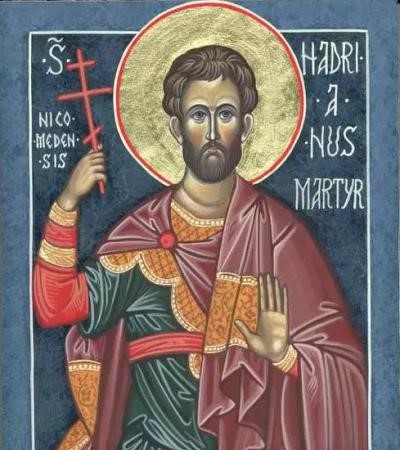
Saint of the Day for 5 March: St. Adrian of Caesarea
St. Adrian of Caesarea: Martyr and Protector, the Story of Faith and Courage
Name
St. Adrian of Caesarea
Title
Martyr
Birth
III Century, Adria, Rovigo
Death
March 5, 309, Caesarea in Palestine
Recurrence
5 March
Martyrology
2004 edition
Prayer
O God, who in the glorious martyrdom of St. Adrian you gave us a sign of your loving presence in the Church, grant that we, who trust in his intercession, may imitate him in firmness of faith. Through our Lord Jesus Christ.
Roman Martyrology
In Caesarea in Palestine, St. Adrian, a martyr, who, during the persecution of Emperor Diocletian, on the day when the inhabitants used to celebrate the Feast of Fortune, by order of the governor Firmilianus, was for his faith in Christ first thrown to a lion and then slashed with the sword.
The Saint and Mission
Saint Adrian of Caesarea, martyr of Christianity in the early stages of its history, embodies the courage and determination of those who chose to bear witness to their faith in the face of the most severe persecution. His life and final sacrifice offer a profound reflection on the nature of Christian mission, highlighting the power of personal testimony in the context of extreme challenges. Saint Hadrian’s mission took place in a period in which being a Christian could mean facing death. However, Hadrian’s determination to remain faithful to his spiritual principles in the face of suffering and death demonstrates a profound understanding of the Christian commitment. His martyrdom is not simply an act of passive resistance, but an active declaration of God’s sovereignty and the eternity of his promises. In this sense, Hadrian and his fellow martyrs extended the Christian mission through their supreme sacrifice, preaching the Gospel not with words, but with the example of their faithfulness. Furthermore, the story of Saint Hadrian of Caesarea reminds us that the Christian mission often calls the faithful to confront earthly powers, challenging injustices and bearing witness to a truth that transcends human laws. Hadrian, through his martyrdom, poses an ethical and spiritual challenge to his time and to the established powers, demonstrating that loyalty to Christ surpasses any other earthly bond or obligation. Hadrian’s mission also highlights the importance of community in the Christian faith. His martyrdom was not an isolated act, but one that he shared with other believers, strengthening the bond between members of the Christian community through the sharing of suffering and hope. This communal dimension of martyrdom reflects the very nature of the Church as the Body of Christ, united in suffering as in glory. Finally, the life and martyrdom of St. Hadrian of Caesarea continues to inspire Christians of every age to reflect on the depth and cost of their faith. His story invites us to consider what it truly means to bear witness to Christ in our world, reminding us that the Christian mission may require extreme sacrifices, but is also a source of joy and hope that no persecution can extinguish. Saint Hadrian of Caesarea offers us a model of courage, faithfulness and testimony that continues to speak to the hearts of believers today, reminding us that the mission of bringing the message of Christ to the world sometimes involves great challenges, but is always supported by the promise of his eternal and victorious presence.
The Saint and Mercy
Saint Adrian of Caesarea, with his testimony of faith and his martyrdom, profoundly illuminates the concept of Christian mercy through supreme sacrifice. His story reveals how mercy can manifest itself even in the most extreme circumstances, not only as an act of compassion towards others, but also as a profound expression of trust in the mercy of God. The martyrdom of Saint Hadrian takes place in a of persecution, where the decision to remain faithful to one’s faith in the face of death represents the maximum expression of mercy. This choice is not only an act of personal devotion, but also a gesture of mercy towards the Christian community and the entire world, offering a testimony to the saving power of faith in Christ. His faithfulness to the end is a reminder of God’s promise of mercy and redemption for those who trust in Him. Furthermore, the story of Saint Hadrian reminds us that mercy can be a difficult path and require great sacrifice. In his case, mercy manifests itself in the willingness to suffer and offer one’s life as an act of love towards God and towards his brothers and sisters in faith. This understanding of mercy, which goes beyond simple pity or material assistance, touches the very heart of the Paschal mystery: the love that gives everything, even life, for the good of others. Saint Hadrian’s mercy towards those who persecuted him also offers a reflection on the transformative nature of divine mercy. Instead of responding to hate with hate, his example of forgiveness and unconditional love highlights how mercy can break cycles of violence and open paths to conversion and healing. His ability to keep love at the center of his testimony, even in the darkest moments, is a powerful demonstration of how mercy can triumph over evil. Saint Adrian of Caesarea teaches us that mercy is at the heart of the Christian mission. His life and martyrdom invite us to reflect on the depth of our commitment to live by the principles of mercy, challenging us to consider how we can bear witness to God’s love in a world often marked by indifference and pain. His spiritual legacy encourages us to be instruments of mercy, illuminating the path towards God with the light of our faith and our love.
Hagiography
He suffered martyrdom with Eubulus the year 309, the “sixth year of the persecution,” according to the testimony of Eusebius. Having both come to Caesarea in Palestine to help the martyrs of that city, the two saints were discovered and…
